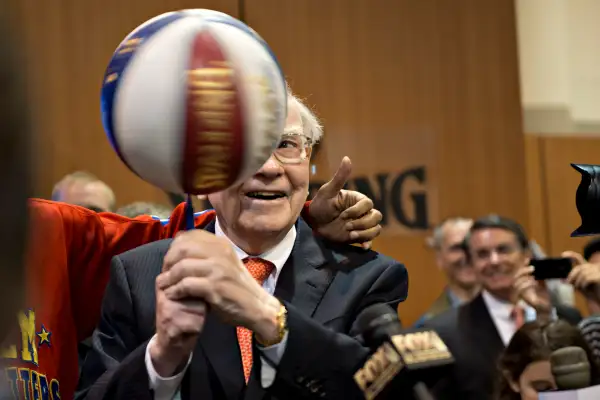Warren Buffett Will Give $1M Per Year for Life to the Employee Who Aces Opening NCAA Rounds

Warren Buffett is annoyed at your bad attitude about the future of the U.S., but he's still in a very giving mood.
The day after the Oscar pool results came out, the billionaire and Berkshire Hathaway CEO and President announced the stakes for the next pool in the calendar—March Madness.
If you're lucky enough to work at Berkshire and somehow eke out a win in the office Madness pool, you will walk into the office the next morning with a $100,000 check waiting for you.
But it doesn't just stop there.
Berkshire employees who predict the first two rounds perfectly get $1 million every year for the rest of their lives.
So what exactly are the odds of accomplishing this feat?
A quick back of the envelope calculation shows that they're not great. There are two outcomes of any given game and the first two rounds comprise 48 games, yielding 280 trillion possibilities. But that's if you're just guessing, which is obviously unrealistic since seeding at least gives somewhat of an indication of probability.
When Buffett had his $1 billion bounty for a perfect bracket in 2014, DePaul math professor Jeff Bergen developed a solid method for approximating the odds for a knowledgeable bracket owner, pegging it at 1 in 128 billion for acing the entire tournament.
I spoke to Bergen about his method, and he told me that for the first two rounds, he found that the probability of acing the first two rounds (out of six total) for a relatively knowledgable fan was merely 1 in 16.8 million, which explains why Buffett only opened the pool up to Berkshire's entire 316,000 person staff. Had he opened it up to anyone like 2014, a winner would have been far likelier. As Bergen told me on the phone, "Buffet doesn’t tend to make stupid bets."
If the 316,000 employees all fill out different brackets (perhaps unlikely) there's a 1.9% chance that someone will actually win. And the payout would be huge: A winner who is 40 years old, for example, will receive $45 million if they reach Buffett's current age of 85.
While Buffett could easily insure this himself, it's likely he's bought insurance against this, as he did in 2014 with his $1 billion challenge.
Download Your Printable March Madness Bracket Here
Considering the low 1.9% odds of anyone actually winning, and a payout of $45 million (if the average employee age is 40 and lives to 85), insurance would cost something like $1 million.
The $100,000 winner's check and the cost of insuring the unlikely perfect opening rounds may be high, but with Buffett's business record, that money isn't likely going to waste—it's an investment in morale. And reiterating what Bergen said, it's probably a good one.